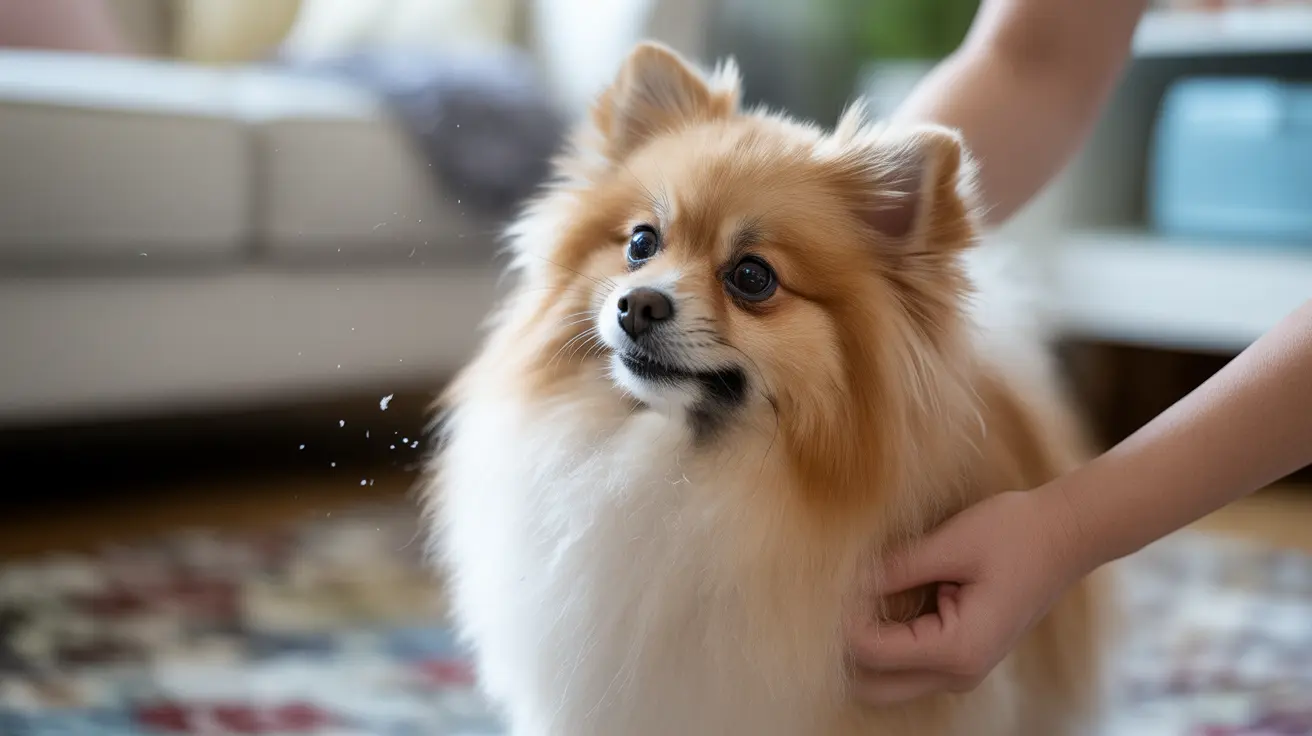If you've noticed white flakes in your dog's fur or on their bedding, you're likely dealing with canine dandruff. This common skin condition affects many dogs, causing flaky, itchy skin that can be both uncomfortable for your pet and concerning for you as an owner.
Understanding Dog Dandruff: What It Is and Why It Happens
Dog dandruff occurs when your pet's skin cells shed at an accelerated rate or abnormally, resulting in visible white flakes in their coat. This condition can be caused by various factors, including dry air, poor nutrition, allergies, or underlying health issues. While some amount of skin cell turnover is normal, excessive flaking often indicates a problem that needs attention.
Common Causes of Dog Dandruff
Environmental Factors
Dry indoor air, especially during winter months, can significantly impact your dog's skin health. Using a humidifier and maintaining proper indoor humidity levels (between 30-50%) can help prevent dry, flaky skin.
Dietary Issues
Poor nutrition or lack of essential fatty acids in your dog's diet can lead to skin problems. Ensuring your pet receives a balanced diet rich in omega-3 and omega-6 fatty acids is crucial for maintaining healthy skin and coat.
Medical Conditions
Several health issues can cause or worsen dandruff, including:
- Seborrhea (both oily and dry forms)
- Allergies (environmental or food-based)
- Parasitic infections
- Hormonal imbalances
- Fungal or bacterial infections
Effective Treatment Solutions
Proper Grooming
Regular brushing helps distribute natural oils throughout your dog's coat and removes dead skin cells. Use appropriate grooming tools for your dog's coat type, and establish a consistent grooming routine.
Medicated Treatments
When necessary, your veterinarian may recommend:
- Special anti-dandruff shampoos
- Moisturizing treatments
- Medicated sprays or ointments
- Oral medications for underlying conditions
Dietary Improvements
Enhance your dog's diet with:
- High-quality protein sources
- Essential fatty acid supplements
- Vitamin E-rich foods
- Adequate hydration
Prevention Tips
Prevent recurring dandruff issues by:
- Maintaining regular grooming schedules
- Using appropriate dog-specific products
- Monitoring indoor humidity levels
- Providing a balanced, nutritious diet
- Scheduling regular veterinary check-ups
When to Consult a Veterinarian
Seek professional help if you notice:
- Persistent or severe dandruff
- Excessive scratching or discomfort
- Red, inflamed, or irritated skin
- Hair loss
- Strong odors from the skin
- Changes in behavior or appetite
Frequently Asked Questions
Why do dogs get dandruff, and is it treatable?
Dogs get dandruff due to various factors including dry skin, allergies, poor nutrition, or underlying health conditions. Most cases are treatable through proper grooming, diet improvements, and addressing any underlying medical issues.
How can I naturally prevent dandruff in my dog during the winter months?
Use a humidifier indoors, maintain regular grooming practices, provide omega-rich supplements, and protect your dog from extreme temperature changes. Also, avoid over-bathing which can strip natural oils from their skin.
What are the best home remedies for dog dandruff, and when should I seek a vet?
Effective home remedies include regular brushing, oatmeal baths, and coconut oil massages. Consult a vet if dandruff persists despite home treatment or if accompanied by other symptoms like severe itching or hair loss.
Can a dog's diet cause dandruff, and which foods are best for skin health?
Yes, poor nutrition can contribute to dandruff. Foods rich in omega-3 fatty acids (like fish), high-quality proteins, and vitamins A and E support healthy skin. Consider supplements if recommended by your veterinarian.
How do I differentiate between common dandruff and more serious skin conditions in dogs?
Common dandruff typically presents as white flakes without other symptoms. More serious conditions usually involve additional signs like redness, inflammation, strong odors, or behavioral changes. When in doubt, consult your veterinarian for proper diagnosis.






